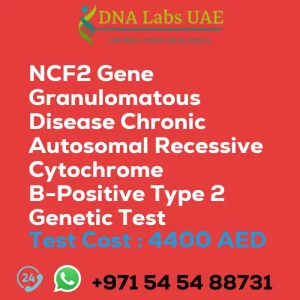HBG2 Gene Hereditary Persistence of Fetal Hemoglobin Genetic Test
Components
- Price: 4400.0 AED
- Sample Condition: Blood or Extracted DNA or One drop Blood on FTA Card
- Report Delivery: 3 to 4 Weeks
- Method: NGS Technology
- Test type: Hematology
- Doctor: Hematologist
- Test Department: Genetics
Pre Test Information
Clinical History of Patient who is going for HBG2 Gene Hereditary persistence of fetal hemoglobin NGS Genetic DNA Test. A Genetic Counselling session to draw a pedigree chart of family members affected with HBG2 Gene Hereditary persistence of fetal hemoglobin NGS Genetic DNA Test gene HBG2.
Test Details
The HBG2 gene is responsible for producing the fetal hemoglobin protein. Hereditary persistence of fetal hemoglobin (HPFH) is a condition where individuals continue to produce fetal hemoglobin into adulthood instead of transitioning to adult hemoglobin. NGS (Next-Generation Sequencing) genetic testing is a method used to analyze the DNA sequence of an individual. In the context of HBG2 gene and HPFH, NGS genetic testing can be used to identify any mutations or variations in the HBG2 gene that may be responsible for the condition. By sequencing the entire HBG2 gene, NGS testing can provide detailed information about any genetic changes that may be present. This can help in the diagnosis of HPFH and provide insights into the inheritance pattern of the condition within a family.
NGS genetic testing is a powerful tool that allows for the analysis of multiple genes simultaneously and can provide a comprehensive view of an individual’s genetic makeup. It can be used to identify mutations, determine carrier status, and provide information about the risk of developing certain genetic conditions. In the case of HBG2 gene and HPFH, NGS genetic testing can be particularly useful in diagnosing the condition and providing information about the risk of passing it on to future generations. It can also be used to guide treatment decisions and provide genetic counseling to affected individuals and their families.
| Test Name | HBG2 Gene Hereditary persistence of fetal hemoglobin Genetic Test |
|---|---|
| Components | |
| Price | 4400.0 AED |
| Sample Condition | Blood or Extracted DNA or One drop Blood on FTA Card |
| Report Delivery | 3 to 4 Weeks |
| Method | NGS Technology |
| Test type | Hematology |
| Doctor | Hematologist |
| Test Department: | Genetics |
| Pre Test Information | Clinical History of Patient who is going for HBG2 Gene Hereditary persistence of fetal hemoglobin NGS Genetic DNA Test. A Genetic Counselling session to draw a pedigree chart of family members affected with HBG2 Gene Hereditary persistence of fetal hemoglobin NGS Genetic DNA Test gene HBG2 |
| Test Details |
The HBG2 gene is responsible for producing the fetal hemoglobin protein. Hereditary persistence of fetal hemoglobin (HPFH) is a condition where individuals continue to produce fetal hemoglobin into adulthood instead of transitioning to adult hemoglobin. NGS (Next-Generation Sequencing) genetic testing is a method used to analyze the DNA sequence of an individual. In the context of HBG2 gene and HPFH, NGS genetic testing can be used to identify any mutations or variations in the HBG2 gene that may be responsible for the condition. By sequencing the entire HBG2 gene, NGS testing can provide detailed information about any genetic changes that may be present. This can help in the diagnosis of HPFH and provide insights into the inheritance pattern of the condition within a family. NGS genetic testing is a powerful tool that allows for the analysis of multiple genes simultaneously and can provide a comprehensive view of an individual’s genetic makeup. It can be used to identify mutations, determine carrier status, and provide information about the risk of developing certain genetic conditions. In the case of HBG2 gene and HPFH, NGS genetic testing can be particularly useful in diagnosing the condition and providing information about the risk of passing it on to future generations. It can also be used to guide treatment decisions and provide genetic counseling to affected individuals and their families. |








